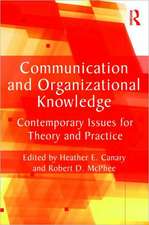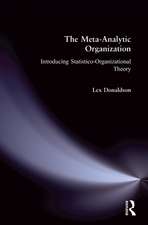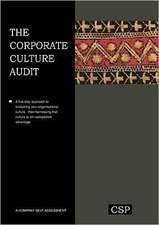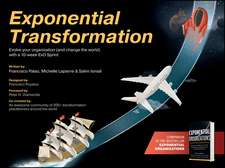A New History of Management
Autor Stephen Cummings, Todd Bridgman, John Hassard, Michael Rowlinsonen Limba Engleză Paperback – 18 sep 2017
| Toate formatele și edițiile | Preț | Express |
|---|---|---|
| Paperback (1) | 304.23 lei 43-57 zile | |
| Cambridge University Press – 18 sep 2017 | 304.23 lei 43-57 zile | |
| Hardback (1) | 784.32 lei 43-57 zile | |
| Cambridge University Press – 27 sep 2017 | 784.32 lei 43-57 zile |
Preț: 304.23 lei
Nou
Puncte Express: 456
Preț estimativ în valută:
58.21€ • 60.94$ • 48.17£
58.21€ • 60.94$ • 48.17£
Carte tipărită la comandă
Livrare economică 07-21 aprilie
Preluare comenzi: 021 569.72.76
Specificații
ISBN-13: 9781316502907
ISBN-10: 1316502902
Pagini: 394
Dimensiuni: 152 x 229 x 20 mm
Greutate: 0.54 kg
Editura: Cambridge University Press
Colecția Cambridge University Press
Locul publicării:Cambridge, United Kingdom
ISBN-10: 1316502902
Pagini: 394
Dimensiuni: 152 x 229 x 20 mm
Greutate: 0.54 kg
Editura: Cambridge University Press
Colecția Cambridge University Press
Locul publicării:Cambridge, United Kingdom
Cuprins
1. Rethinking the map of management history; 2. Management's formation: the importance of the liberal context; 3. To what end? The nature of management's classical approach; 4. The birth of organization science: or what we could learn from Max Weber; 5. The institution of the business school; 6. The discovery of the human worker; 7. Textbook distortions: how management textbooks process history and limit future thinking; 8. The invention of corporate culture; 9. Remaking management history: new foundations for the future.
Recenzii
'Much of management thought is based on taken for granted assumptions about 'best practices' that emerged from a very narrow space of place and time. Cummings, Bridgman, Hassard and Rowlinson deftly strip away these cultural and historical assumptions and raise serious questions about what we think we know about management. Like the Matrix, A New History of Management will make you see the world of business in a whole new way.' Roy Suddaby, University of Victoria, Canada and Newcastle University
'This book settles the matter once and for all: sustainability and social responsibility are not fads but the very heart of what management is about. The authors have done a monumental service by restoring this vision to its central place and showing us how to achieve it.' Ellen S. O'Connor, Institute for Leadership Studies, Dominican University of California
'This marvellous book, thoughtful and constructively critical, does a great service to the field in seeking to retell management history by exploring the development of management theories afresh. If we want to imagine possibilities for the future, we must review the past.' Haridimos Tsoukas, University of Warwick and University of Cyprus
'This brilliant, ambitious book more than lives up to its promise. By revisiting the history of management theory, it uncovers surprising ideological underpinnings and provides a roadmap to rethink management's origins, traditions and horizons.' Raza Mir, William Patterson University, New Jersey
'Michel Foucault argued that curiosity, innovation in thinking and a refusal to accept the self-evident were objectives to which scholars should aspire. A New History of Management attains these heights. To read the book as a counter history to management's woeful attempts to understand itself and its role, is an invitation 'to think differently'. Perhaps, it can also persuade us to act differently too.' Gibson Burrell, University of Leicester and University of Manchester
'This superb new history of management represents a major, landmark contribution to what is still a neglected and poorly understood topic.' Christopher Grey, Royal Holloway, University of London
'In the Wizard of Oz author Frank Baum encourages us to follow the yellow brick road to truth and happiness, ending with the unmasking of the Wizard as a very small (minded) man with a large megaphone. A New History of Management takes us on a much needed journey to look at the scenes of the production of management history. It reveals not one yellow-brick road (rooted in Western thought) but a series of different coloured pathways whose origins lie in places across the globe in the conceptualization of management. Along the way Cummings et al expose the wizardry that goes into producing dominant views of management, unmasking a very limited, male-centered project that reduces management thought to a for profit focus. The effect is liberating and allows us to rethink the character and purposes of management.' Albert Mills, Sobey School of Business, Saint Mary's University, Canada
'Through their careful dissection of the history of management, the authors of this powerful book interrogate the common sense beliefs which silently have reduced management to a question of efficiency of control. By opening up the history of management beyond these false images of thought, this book offers a much-needed resource for radically rethinking what management is and what it can be.' Torkild Thanem, Stockholm University School of Business
'A New History of Management (ANHM) … provides a novel and refreshing perspective on the history of organization and management thought. Reading this book rejuvenated my optimism on the role history can play in both shaping our view of the past and its potential to inform how we see the future … The lucidity of ANHM has the potential to simultaneously broaden the historical organization studies audience, while also challenging researchers to deploy the innovative potential of history.' Gabrielle Durepos, Organization
'A New History of Management is an ambitious work, crafted around a compelling argument: to change the future of management practice, we should look 'more deeply at out interpretations of the past and how these limit our horizons' … The material that follows is well crafted, insightful and compelling. The theory that underpins well-structured arguments is presented beautifully, making reading a pleasure and analysis easy to follow.' Guy Huber, Management Learning
'A New History of Management (ANHM) sets a renewed and higher standard for teaching the history of our field. It confronts commonly accepted textbook representations of the history of management with novel interpretations of 'classical texts', supported by new historical case materials, which together challenge many conventional narratives about management that would typically be taught in business schools. … The major strength of ANHM is that it specifically unsettles the conceptual dominance of the concept of efficiency and instead, invites its readers into a history of management filled with other concepts for innovatively responding to contemporary concerns in business and management.' Gemma Lord, Academy of Management Learning and Education
'I found this well-edited book highly readable and informative, as well as having the advantage of being in an affordable paperback edition. It also has some very good illustrations of original documents. The work has, in addition, a full bibliography and index, which is highly commendable and CUP has produced an elegantly presented text, as might be expected.' Malcolm Warner, Journal of General Management
'This book settles the matter once and for all: sustainability and social responsibility are not fads but the very heart of what management is about. The authors have done a monumental service by restoring this vision to its central place and showing us how to achieve it.' Ellen S. O'Connor, Institute for Leadership Studies, Dominican University of California
'This marvellous book, thoughtful and constructively critical, does a great service to the field in seeking to retell management history by exploring the development of management theories afresh. If we want to imagine possibilities for the future, we must review the past.' Haridimos Tsoukas, University of Warwick and University of Cyprus
'This brilliant, ambitious book more than lives up to its promise. By revisiting the history of management theory, it uncovers surprising ideological underpinnings and provides a roadmap to rethink management's origins, traditions and horizons.' Raza Mir, William Patterson University, New Jersey
'Michel Foucault argued that curiosity, innovation in thinking and a refusal to accept the self-evident were objectives to which scholars should aspire. A New History of Management attains these heights. To read the book as a counter history to management's woeful attempts to understand itself and its role, is an invitation 'to think differently'. Perhaps, it can also persuade us to act differently too.' Gibson Burrell, University of Leicester and University of Manchester
'This superb new history of management represents a major, landmark contribution to what is still a neglected and poorly understood topic.' Christopher Grey, Royal Holloway, University of London
'In the Wizard of Oz author Frank Baum encourages us to follow the yellow brick road to truth and happiness, ending with the unmasking of the Wizard as a very small (minded) man with a large megaphone. A New History of Management takes us on a much needed journey to look at the scenes of the production of management history. It reveals not one yellow-brick road (rooted in Western thought) but a series of different coloured pathways whose origins lie in places across the globe in the conceptualization of management. Along the way Cummings et al expose the wizardry that goes into producing dominant views of management, unmasking a very limited, male-centered project that reduces management thought to a for profit focus. The effect is liberating and allows us to rethink the character and purposes of management.' Albert Mills, Sobey School of Business, Saint Mary's University, Canada
'Through their careful dissection of the history of management, the authors of this powerful book interrogate the common sense beliefs which silently have reduced management to a question of efficiency of control. By opening up the history of management beyond these false images of thought, this book offers a much-needed resource for radically rethinking what management is and what it can be.' Torkild Thanem, Stockholm University School of Business
'A New History of Management (ANHM) … provides a novel and refreshing perspective on the history of organization and management thought. Reading this book rejuvenated my optimism on the role history can play in both shaping our view of the past and its potential to inform how we see the future … The lucidity of ANHM has the potential to simultaneously broaden the historical organization studies audience, while also challenging researchers to deploy the innovative potential of history.' Gabrielle Durepos, Organization
'A New History of Management is an ambitious work, crafted around a compelling argument: to change the future of management practice, we should look 'more deeply at out interpretations of the past and how these limit our horizons' … The material that follows is well crafted, insightful and compelling. The theory that underpins well-structured arguments is presented beautifully, making reading a pleasure and analysis easy to follow.' Guy Huber, Management Learning
'A New History of Management (ANHM) sets a renewed and higher standard for teaching the history of our field. It confronts commonly accepted textbook representations of the history of management with novel interpretations of 'classical texts', supported by new historical case materials, which together challenge many conventional narratives about management that would typically be taught in business schools. … The major strength of ANHM is that it specifically unsettles the conceptual dominance of the concept of efficiency and instead, invites its readers into a history of management filled with other concepts for innovatively responding to contemporary concerns in business and management.' Gemma Lord, Academy of Management Learning and Education
'I found this well-edited book highly readable and informative, as well as having the advantage of being in an affordable paperback edition. It also has some very good illustrations of original documents. The work has, in addition, a full bibliography and index, which is highly commendable and CUP has produced an elegantly presented text, as might be expected.' Malcolm Warner, Journal of General Management
Notă biografică
Descriere
This book argues that if we are to think differently about management, we must first rewrite management history.





























